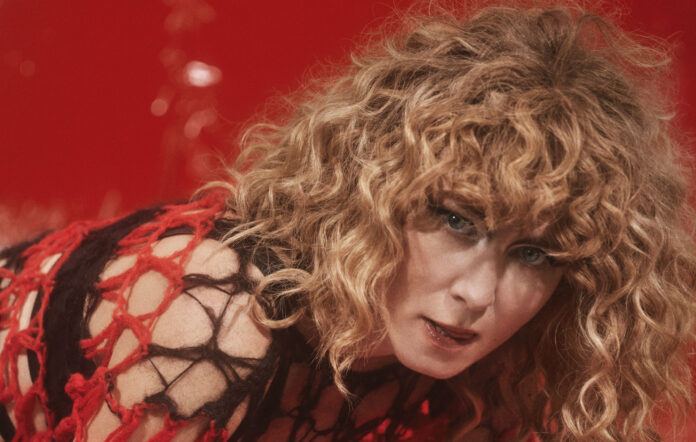The cover of Róisín Murphy’s fifth album Róisín Machine shows the veteran electronic music artist fully draped in another performance art-ready get-up. Fishnet arm sleeves to be adored, full swoosh red wig, and the devil-may-care gaze of a peculiar soul. This archetype is affixed somewhat comfortably upside-down. Murphys’ inexorable commitment to dramatic persona is the natural continuation of a career that pushes back against vanilla presentation. She fashions weirdness by presenting kaleidoscopic characters, wearing lavishly obtuse outfits you could find at the local community playhouse costume closet that fuse into a visual display incorporating several generations of dance music.
All those titles thrown upon Murphy—“disco queen” to “electro-pop icon”—don’t repel her iron-clad fanbase. Indeed, they embrace her idiosyncrasies. Murphy’s recent isolation performance of “Sing it Back,” performed live from her home on Youtube, garnered comments ranging from “when you find a bag of coke in some old jeans,” to “adopt me, Mother.”
When COVID slowed everything down this past spring, the wrinkle provided a moment to better examine this London caricaturist. Broadcasting silly and momentous performances for the Internet, she allowed newcomers to absorb her iconoclasm without the middleman ‘splaining shit. Odd vids and cracking attire delivered the goods Murphy’s way.
Her most recent project, constructed with help from longtime collaborator and friend DJ Parrot a.k.a. Crooked Man, didn’t need a line-up packed with collabs or remixes. Murphy isn’t trying on the disco cape to see if it fits. Unlike divas produced in the Cloud, Róisín moves about genres like a charming dinner party host who used to throw key parties in the ’70s. Her start in the Manchester scene during the late ’80s in the group Moloko left her well aware of what proto-house. This pro does not require a remix from Detroit’s best to boost sales. Dubbed-out disco is her canvas, not her crutch.
New album Róisín Machine, parts of which first saw the light of day on 12” singles in 2012 and 2015, is filled to the teeth with pitched-down 4/4 bliss. Its chuggyness is orchestrated from sturdy dirt mcgirt basslines, bleepy-glitchy crunch, and wavy synths billowing about. The project is sustained via pragmatic build. “Simulation,” the opening slump disco stunner, has no interest in quick hit transactional groove. Nope—kiddies, take your juvenile drop and get. Murphy keeps it grown with that slower BPM mist. So dazed, in fact, that her chants (“This is a simulation, this is for demonstration”) paired with a Fender Rhodes piano, soft-focus snare hits, and steady bass patterns, make this eight-minute fume of opulence stretch out until dawn. Murphy glides about disco-house as if day and night got hitched.
“Incapable,” the extended mix from the LP’s deluxe edition, with its shuffle-foot groove, tiny keyboard house accents, and picking guitar lines, has that big room Lisa Stansfield sonic boom energy. Dramatic strings, carefully arranged vocal scoring wrap around a shoulder-shake bassline.
Murphy sings with regret; “Never had a broken heart/Am I incapable of love/Never seen me fall apart/I must be incapable of love.” These declarations work up to a sweat, and this uninterrupted, dastardly monochrome mood rides out the worthy eight minutes and change. She delivers some type of come-to-Jesus, bare-my-soul bridge over trippy synths, with the beat running; “I don’t know what I’m doing/I don’t know if I can love in all honesty.” The words provide spare access to this impenetrable bump. That’s how Murphy and Parrot cook. They don’t go for the jugular—the sensation is in the tease. Most times, defined climax never comes. Murphy just keeps twirling into the proper disco sunset.




